Music & Concerts
A D.C. homecoming for Mary Chapin Carpenter
Mary Chapin Carpenter readies sold-out Birchmere engagement
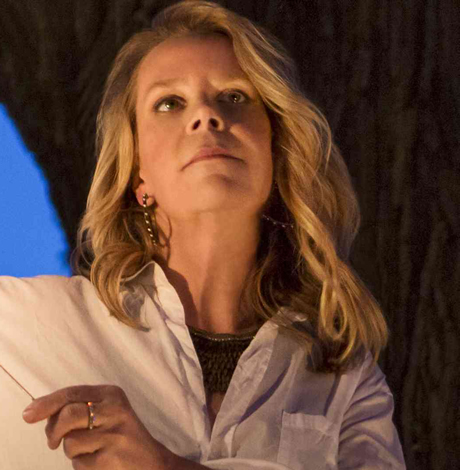
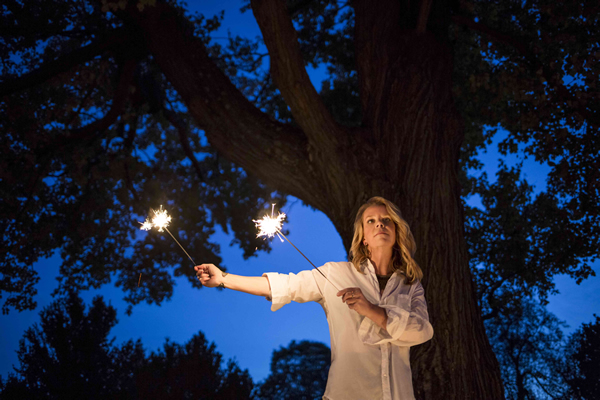
Looking at lyrics for her new album made Mary Chapin Carpenter realize she’s still asking questions. (Photo courtesy Sacks & Co.)
After a four-year break from new material, 2016 finds Mary Chapin Carpenter back with her 14th studio album, “The Things That We Are Made Of.”
Since the release of 2012’s “Ashes and Roses,” the five-time Grammy winner has toured with fellow singer-songwriter Shawn Colvin; released and toured with her 2014 symphonic album, “Songs From the Movie”; and toured an acoustic show last year.
Carpenter will be wrapping up the end of a busy touring year performing two sold-out shows at the Birchmere Dec. 6-7. A few last-minute tickets may be available when the box office opens each evening at 5 p.m.
Carpenter recalls her early days performing at the Birchmere, looking back and being labeled a country artist during a phone chat from her home in the Blue Ridge Mountains.
WASHINGTON BLADE: What are your memories of singing at the Birchmere?
MARY CHAPIN CARPENTER: I don’t know when the exact first time I ever had a show there. I started playing there in the early ’80s as an opener and as part of other groups. It’s much bigger than it used to be. The new Birchmere has been there a long time now. The old Birchmere used to be about a quarter of the size. It really was an intimate space and one of the premier listening rooms in the country. Now they can bring bigger shows and there’s more seats, but it’s still such a revered listening room.
BLADE: Does it feel the same playing there now?
CARPENTER: You mean the same feeling of being nervous and scared? Yes! (laughs)
BLADE: You’ve played the Birchmere and Wolf Trap many times. Do you have a preference?
CARPENTER: They’re so different. I don’t prefer one over the other. Certainly, the Birchmere being more intimate, it’s an opportunity to be more free wheeling and chatting with the audience where with Wolf Trap, it’s so vast, but it’s still possible to feel the collective energy of 7,000 people. I feel so lucky to be a resident of this area in the sense that I have two hometown stages that mean the world to me and they’re both very different, but they’re both deeply meaningful to me in terms of my career and what it feels like to play music. I have gone to both as a listener for so long before I had the good fortune to play those stages, they’re just treasures.
BLADE: Tell us about your current tour.
CARPENTER: It’s actually been a few years since I toured with a band, so reconvening the band incarnation with brand new music just lifts you up and makes you feel energized with new players and new music.
BLADE: And your new album?
CARPENTER: What this record is about in my mind, it’s about asking questions. When I laid down all the lyrics to proofread, it’s an odd thing, it wasn’t until I did that, looked at each song physically next to one another that I realized that so many of the lyrics in the songs are posed in the form of the question. What it made me feel was that given the subject matter that it’s far more important when you reach a certain time in your life to just feel that you’re still asking questions and you’re still curious and you’re more comfortable with the idea of not knowing because you can’t have all the answers and that’s OK. It’s just remaining open, inquisitive, open-hearted, alert to everything around you and accepting.
BLADE: When you listen to “The Things That We Are Made Of,” it’s distinctly different than your last album, “Ashes and Roses.” Do your albums reflect where you currently are in the different stages of your life?
CARPENTER: Yeah, I hope so. I heard this wonderful interview with Anne Patchett, she was on Diane Rehm and I was listening to it. She’s one of my favorite authors and she said something that I don’t remember the exact words, but I’ll paraphrase, it was every book she’s written has led to the next one. It made a lot of sense to me as someone who tries to create these sort of worlds where every couple years another world exists, a world of song. This record, I understand where people say it’s very different or whatever, but from my position it doesn’t feel so much different as a natural next place to go.
BLADE: Looking back is a recurring theme in your work. Is that a conscious decision?
CARPENTER: I just can’t help it (laughs). I think songwriting, as a creative form of expression, I mean, on one hand it’s a deeply personal exercise and you’re trying to express your feelings, trying to express yourself within the world and it’s about connection as well. That’s the gift of live music of course. When we’re in our 20s and 30s and even in our 40s, I think we have a sense that life is going to last forever. It’s only when the challenges, the losses, the changes in our lives, the loss of parents or a health issue that tend to come upon us as we reach the mid point. Those are the things that kind of stop you in your tracks and not so much teach you, but alert you to the fact that no, you’re not going to live forever. There’s a reason people have crises at times of their lives because mortality is a difficult thing to grasp.
BLADE: We all have moments in our lives where things are constantly changing whether we want them to or not. How do you deal with the unexpected?
CARPENTER: You have to be comfortable not being in control. I think of myself, my personality is I like order out of chaos. I like things to be organized, I like to know what I’m doing. It’s just this disillusion idea that I’m in control, but I’m not. The greatest test for me is when things blow up and you sort of have to regroup. You have to feel that all’s not lost. The idea is when you’re a younger person, is that when things blow up, “Oh my God, it’s the worst thing that ever happened,” but later in life, there’s a freedom that comes around where you’re not so invested or — it sounds so Oprah like — but you’re not so attached to the outcome. You’re able to handle a blow up and realize it’s not the end of the world.
BLADE: When did you first notice you had a gay following?
CARPENTER: It’s funny to me because I never think about it. It’s never been something I ever sort of thought about it. So in that regard, I guess I have no idea. I’ve always been so happy just to look out into the audience and see people.
BLADE: How does it feel testing out new songs on the road?
CARPENTER: It helps me to sort of hone the song. I go into the studio with 25, 30 songs and I don’t record all of them, but I have a sense of what I think are the strongest and playing them out and getting a sense of how they feel that way, as opposed to just playing them in my house. It does sort of weed things out.
BLADE: Will you be doing anything special next year for your 30th anniversary in music?
CARPENTER: Next year marks the 30th anniversary of my first record (“Hometown Girl”) so we’re talking about a project, something special to kind of mark it and a live record is certainly on the list.
BLADE: Does it ever bother you being labeled a country artist?
CARPENTER: It’s not something I reject. I spent 20 years on the Nashville Columbia label. It was an incredible opportunity and I got to reach so many people. It’s given me everything I use today and it’s allowed me to go where I’ve wanted to go. I think of starting out and having this label, “country” as nothing I could reject in anyway and I’m proud of the music and the times and everything we did during those years. That said, I don’t think it really applies to me anymore. Furthermore, I grew up listening to all sorts of music. Labels were for soup cans as the saying goes. It’s just not something I paid a whole lot of attention to and made to feel to be a big deal. I just sort of feel like we all play music and we just want to connect with who we connect with.
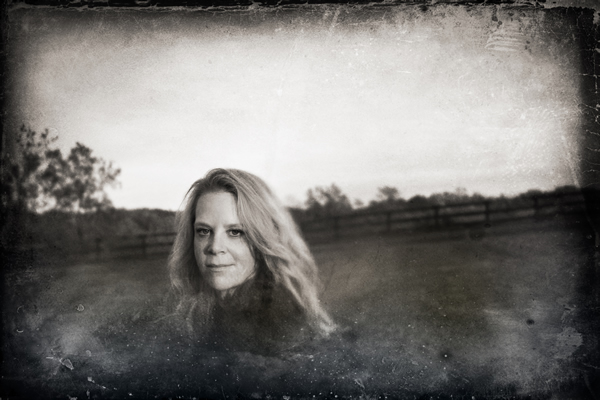
Mary Chapin Carpenter (Photo courtesy Sacks & Co.)
Music & Concerts
Washington chorale kicks off Christmas with vibrant program
‘Thine Own Sweet Light’ concerts planned
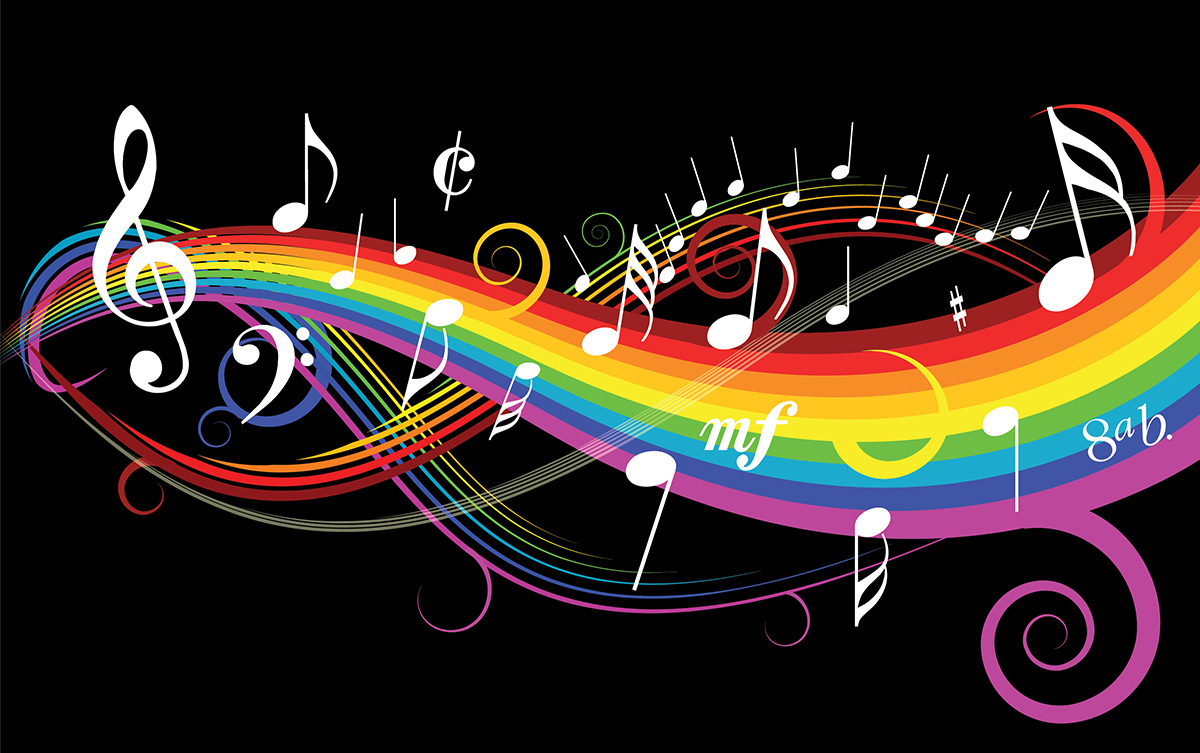
The full Washington Master Chorale will return for its annual holiday concert tradition with “Thine Own Sweet Light” on Friday, Dec. 19 and Sunday, Dec. 21 at St. Ann’s Catholic Church (D.C.) and Church of the Epiphany (D.C.).
The concert will feature the rich sounds of the 50-voice, a cappella chorus performing lush, seasonal choral music inspired by the theme of light. Highlights include Edvard Grieg’s “Ave Maris Stella,” Eric Whitacre’s “Lux Aurumque,” and Christopher Hoh’s “Holy, Holy, Holy is the Lord God of Hosts.” The program will also present a new work by Barcelona composer Josep Ollé i Sabaté, along with charming holiday folk songs and seasonal favorites.
For more details, visit the Washington Master Chorale website.
Music & Concerts
Queer mega stars (and allies) ready to take D.C. stages this fall
Watch LGBTQ icons light up stages across the DMV as they sing, dance, and drag their way through spectacular shows.
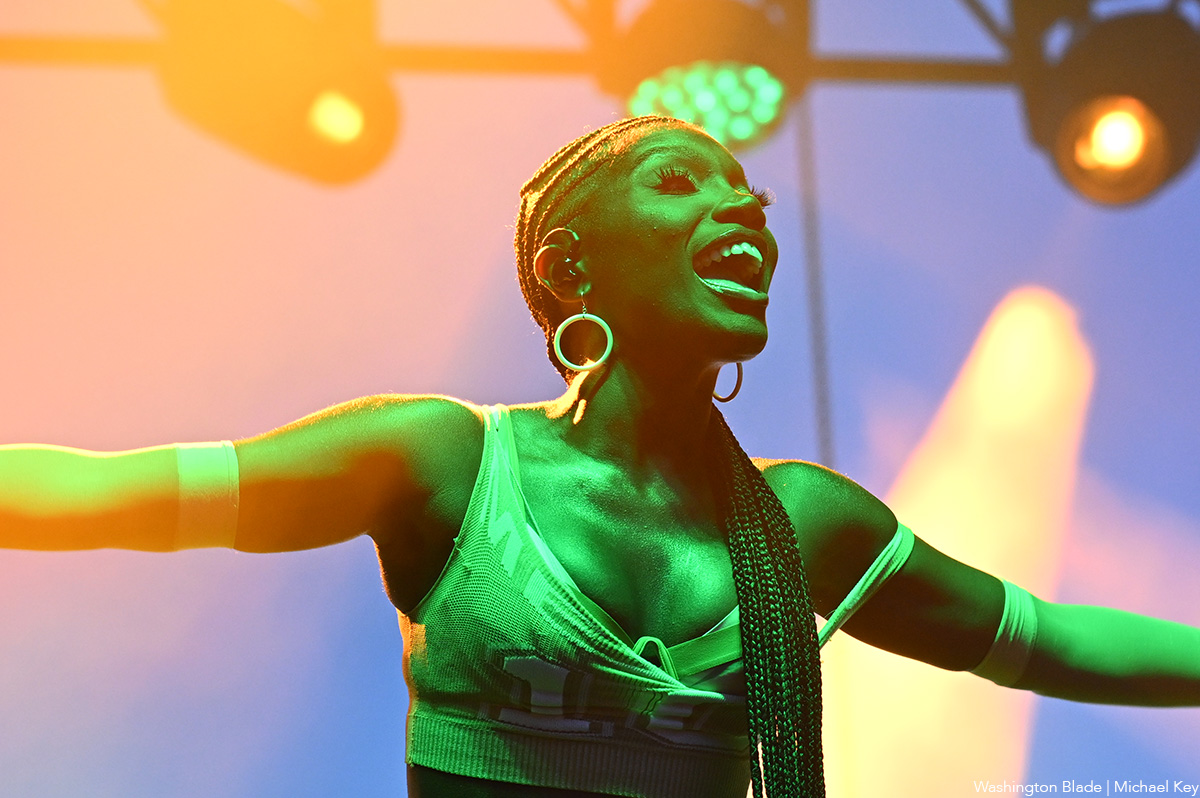
One of the best ways to welcome fall is by catching LGBTQ performers (and their allies) lighting up some of the D.C. area’s biggest stages. From country and pop to drag and rock, the season is packed with shows you won’t want to miss.
Maren Morris – The country, rock, and pop diva—known for hits like “The Bones” and for standing up against Nashville’s anti-LGBTQ voices—takes the stage at Wolf Trap (1551 Trap Rd, Vienna, Va.) on Friday, Sept. 12 at 8 p.m. Tickets start at $64.
RuPaul – The mother of modern drag and host of “RuPaul’s Drag Race” will spin a DJ set at Echostage (2135 Queens Chapel Rd NE) in Northeast D.C. on Sept. 20. Before RuPaul swaps wigs for headphones, Trade and Number 9 owner Ed Bailey will warm up the decks. For tickets and details visit echostage.com.
Conan Gray – The queer pop prince, celebrated for his Gen Z anthems like “Heather” and “Maniac,” brings his Wishbone Pajama Show to EagleBank Arena in Fairfax, VA, (4500 Patriot Cir) on Sept. 20 at 8 p.m. Tickets start at $113. For more info visit shop.conangray.com/pages/tour.
All Things Go Music Festival – With a lineup that includes Noah Kahan, Lucy Dacus, Kesha, Clairo, Doechii, and more, the beloved LGBTQ-friendly festival takes over Merriweather Post Pavilion (10475 Little Patuxent Pkwy, Columbia, Md.) Sept. 26–28. For tickets and details visit allthingsgofestival.com.
BERTHA: Grateful Drag – This unique tribute brings drag artistry and the sounds of the Grateful Dead to The Atlantis (2047 9th St NW) on Sept. 27. Tickets start at $47 at theatlantis.com.
Peach PRC – Rising Australian pop star and out lesbian, whose confessional tracks like “Perfect for You” and “Forever Drunk” have made her a queer TikTok darling, performs at The Atlantis on Sept. 29 at 6:30 p.m. The show is general admission only. Additional details are on theatlantis.com.
Addison Rae – The TikTok star-turned-pop princess, who’s crossed over into music with glossy hits like “Diet Pepsi” brings her sold out show to The Anthem (901 Wharf St., S.W.) on Sept. 30. Tickets are sold out, but resale options start around $80. For more info visit theanthemdc.com.
The Rocky Horror Picture Show 50th Anniversary – Celebrate the cult classic that’s been a queer midnight-movie staple for decades, with Barry Bostwick (a.k.a. Brad Majors) at the Warner Theatre (513 13th St., N.W.) on Oct. 2 at 8 p.m. Tickets start at $41 via Ticketmaster.
Chaka Khan, Patti LaBelle, Gladys Knight & Stephanie Mills – Four legends, one stage. Between Khan’s funk, LaBelle’s soul, Knight’s R&B, and Mills’ powerhouse vocals, this concert at Capital One Arena (601 F St NW) on Oct. 3 at 8 p.m. promises pure diva magic. Tickets start at $103. For more details visit capitalonearena.com.
Lorde – Joined by The Japanese House and Chanel Beads, the Grammy-winning New Zealand singer-songwriter behind “Royals” and “Solar Power” returns to The Anthem on Oct. 4 at 7 p.m. Lorde has long been embraced by queer fans for her dreamy pop and subversive lyrics. For more info visit theanthemdc.com.
Andy Bell (of Erasure) – The British queer rock icon, best known for synth-pop classics like “A Little Respect” and “Chains of Love,” brings his Ten Crowns Tour to the Lincoln Theatre (1215 U St., N.W.) on Friday, Oct. 17 at 8 p.m. Tickets are $90.45.
Doechii – The self-described queer “Swamp Princess”—and WorldPride 2025 headliner—continues her breakout year with the Live from the Swamp Tour at The Anthem on Oct. 21 at 8 p.m. Known for blending rap, R&B, and avant-garde performance art, Doechii is one to watch. Tickets start at $153.
Neon Trees – The out-and-proud Utah rockers behind “Everybody Talks” and “Animal” perform at the Lincoln Theatre on Friday, Oct. 24 at 8 p.m. Lead singer Tyler Glenn, who came out publicly in 2014, has become a strong queer voice in alternative rock. For tickets and info visit impconcerts.com.
Sasha Colby – The “RuPaul’s Drag Race” Season 15 winner strips down on the Stripped II Tour at the Warner Theatre on Nov. 2 at 8 p.m. Tickets available now on Ticketmaster.
Lola Young – The bisexual indie-pop sensation, whose raw songwriting has earned her millions of TikTok fans and multiple chart soaring hits visits The Anthem on Nov. 9 at 8 p.m. Tickets are still available.
Opera Lafayette
Featuring Mary Elizabeth Williams as Dido
+ Elijah McCormack, Chelsea Helm
Oct. 16, 7:30 p.m.
Sixth & I
PostClassical Ensemble
The Pale Blue Do: A Musical Voyage Inspired By Nature
Featuring National Geographic’s Enric Sala, Guest Curator
Wednesday, November 19, 7:30 p.m.
Terrace Theater
Washington Concert Opera
Starring Kate Lindsey, Theo Hoffman, John Moore, and Fran Daniel Laucerica
Nov. 23, 6 p.m.
Lisner Auditorium
Washington Master Chorale
An intimate a capella concert taking place in an architectural jewel, featuring cherished choral gems from Anglican and Catholic tradition and early American hymns. The concert will also present the world premiere of Christopher Hoh’s Holy, Holy, Holy is the Lord God of Hosts, and hymn singing featuring Robert Church, organist and choirmaster at St David’s.
Oct. 18, 7:30 p.m.
October 19, 5 p.m.
St. David’s Episcopal Church
Music & Concerts
Cyndi Lauper ready to have fun in Virginia
Superstar to bring final leg of farewell tour to Jiffy Lube Live
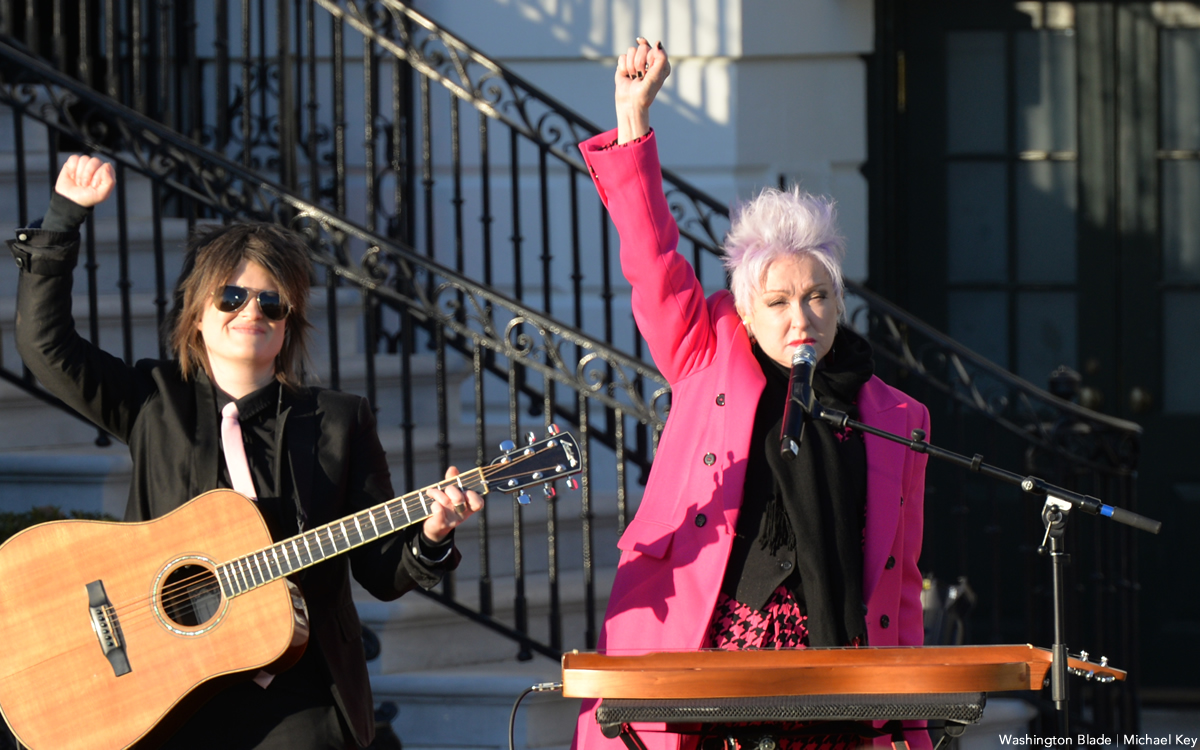
Superstar Cyndi Lauper will bring the final leg of her farewell tour “Girls Just Wanna Have Fun” to Bristow, Va., on Thursday, July 24 at Jiffy Lube Live.
Lauper’s international Farewell Tour – her first major headlining run in a decade – kicked off in North America last October, and included her first time ever headlining (and selling out) Madison Square Garden. Lauper’s performances have earned raves from the New York Times, Rolling Stone, Billboard, and many more, and surprise guests have included Chaka Khan, Sam Smith, and Hayley Williams. The tour just visited the U.K. and Europe, and will head to Australia and Japan in April.
Tickets are available on Live Nation’s website.
-

 District of Columbia5 days ago
District of Columbia5 days agoCapital Pride board member resigns, alleges failure to address ‘sexual misconduct’
-

 India4 days ago
India4 days agoActivists push for better counting of transgender Indians in 2026 Census
-

 Advice4 days ago
Advice4 days agoDry January has isolated me from my friends
-

 District of Columbia4 days ago
District of Columbia4 days agoCapital Pride reveals 2026 theme




















